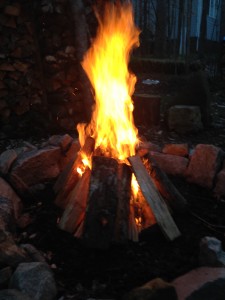It was 3:00 am one week day morning this April. The whole house had long been asleep when we were startled by the sound of a fire alarm. My husband and I jumped out of bed disoriented…. is there a fire? We didn’t smell any smoke... Our youngest daughter was frightened and crying hysterically, our older daughter somehow continued to sleep through the commotion, and our 12 year old black lab was a panting, trembling mess...
Once realizing there was not a fire and we were safe, the task was trying to figure out which alarm was triggering the entire second floor to go off. We discovered the problem was a low battery, so I took off downstairs hoping to find a replacement and was relieved to locate one remaining 9 volt in the drawer. After several minutes we were able to locate the correct detector and silence the house. This was a great reminder to not only have back up batteries on hand at all times but to remember to test the detectors and change out the batteries more frequently. Needless to say I picked up multiple packages the next day!
The month of June is recognized annually as National Safety Month with the intention to encourage families to become aware of the dangers that can occur at home, at work and within the community. According to the National Safety Council, working smoke alarms reduce the chances of dying in a fire by nearly 50 percent. For the best protection, the recommendation is to install smoke alarms on every level of your home as well as in every sleeping area. It’s also necessary to ensure your home has carbon monoxide detectors. These should also be located on every level of your home, near sleeping areas, but always kept 15 feet away from fuel-burning appliances.
Some other fire safety tips to follow:
- Make a habit of placing matches and lighters up and away from young children.
- Create and practice a home fire escape plan ensuring a way out of every room in the case of a fire and practice it twice a year.
- Test smoke alarms at least once a month and replace conventional batteries once a year or when the alarm “chirps” to tell you the battery is low. Replace any smoke alarm that is more than 10 years old.
- Use common sense. Don’t leave a hot oven or stove top unattended and blow out candles when leaving a room or when going to sleep.
- Inspect electrical cords: Replace cords that are cracked, damaged, have broken plugs, or have loose connections.
- Install sprinklers: If you are building or remodeling your home, install residential fire sprinklers. Sprinklers can contain and may even extinguish a fire in less time than it would take the fire department to arrive.
* To learn more information about National Safety month and other ways to keep you and your family safe please visit: http://www.nsc.org.

